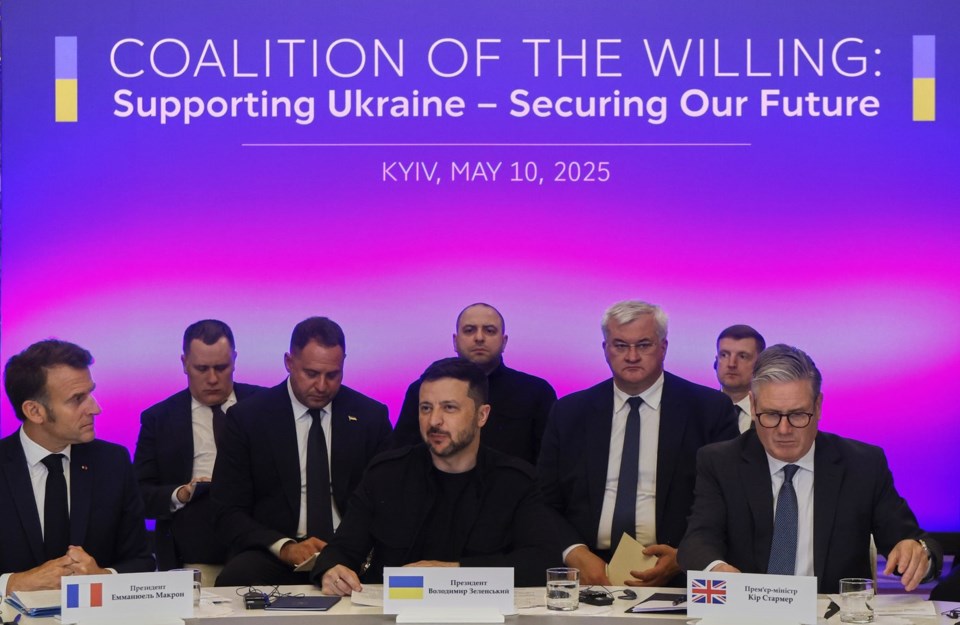KYIV, Ukraine (AP) — In a show of unity in Kyiv on Saturday, leaders from four major European countries threatened to ratchet up pressure if Russian President Vladimir Putin does not accept an unconditional 30-day ceasefire.
The leaders, from France, the United Kingdom, Germany and Poland, said the proposal to start the ceasefire on Monday was supported by U.S. President Donald Trump, whom they had briefed over the phone earlier in the day. Their statement came amid mounting efforts to persuade Moscow to agree to a truce that would allow for peace talks on ending over three years of full-scale war.
The demand was announced in a joint press conference with Ukrainian President Volodymyr Zelenskyy and countries leading the so-called “coalition of the willing”: a group of over 30 countries who have pledged to strengthen Ukraine to deter Russian aggression. They included French President Emmanuel Macron, British Prime Minister Keir Starmer, German Chancellor Friedrich Merz and Polish Prime Minister Donald Tusk, who on Saturday traveled to Ukraine together for the first time.
The ceasefire would include a halt to fighting on land, sea and in the air. The leaders threatened to ratchet up sanctions, including on Russia’s energy and banking sectors, if Putin did not comply.
Earlier that day, Ukrainian Foreign Minister Andrii Sybiha said Kyiv and its allies are ready for a “full, unconditional ceasefire” with Russia for “at least 30 days” starting Monday. He added the four visiting leaders and Zelenskyy had had a “constructive” phone call with Trump.
Saturday marked the last day of a unilateral three-day ceasefire declared by Russia that Ukraine says the Kremlin’s forces have repeatedly violated.
In March, the United States proposed an immediate, limited 30-day truce, which Ukraine accepted, but the Kremlin has held out for terms more to its liking.
Building up Ukraine’s military capabilities will be a key deterrent against Russia, the European leaders said Saturday. This will require supplying Ukraine with robust quantities of arms to deter future attacks and investing in its defense sector. A force comprised of foreign troops could also be deployed as an added “reassurance” measure, Macron said.
The French president added that the United States will take the lead in monitoring a proposed cease-fire, with support from European countries, and threatened “massive sanctions ... prepared and coordinated between Europeans and Americans,” should Russia violate the truce.
But he said details about potential European deployments to Ukraine were still being fine-tuned. No mention was made of NATO membership, still Kyiv’s top choice for a security guarantee.
The priority is to make the war too costly for Russia to keep fighting, Ukraine's Sybiha told reporters on the sidelines of the event.
Retired Lt. Gen. Keith Kellogg, Trump’s special envoy to Ukraine and Russia, said Saturday that a “comprehensive” 30-day ceasefire, covering attacks from the air, land, sea and on infrastructure, “will start the process for ending the largest and longest war in Europe since World War II.”
Earlier on Saturday, the European leaders joined a ceremony at Kyiv's Independence Square marking the 80th anniversary of the end of World War II. They lit candles alongside Zelenskyy at a makeshift flag memorial for fallen Ukrainian soldiers and civilians slain since Russia's invasion.
Trump has pressed both sides to quickly come to an agreement to end the war, but while Zelenskyy agreed to the American plan for an initial 30-day halt to hostilities, Russia has not signed on. Instead, it has kept up attacks along the roughly 1,000-mile (1,600-kilometer) front line, including deadly strikes on residential areas with no obvious military targets.
On Saturday morning, local officials in Ukraine’s northern Sumy region said Russian shelling over the past day killed three residents and wounded four more. Another civilian man died on the spot on Saturday as a Russian drone struck the southern city of Kherson, according to regional Gov. Oleksandr Prokudin.
Speaking to reporters in Kyiv, French President Emmanuel Macron said: “What’s happening with Poland, Germany and Great Britain is a historic moment for European defense and toward a greater independence for our security. Obviously, for Ukraine and all of us. It’s a new era. It’s a Europe that sees itself as a power.”
Trump said last week that he doubts Putin wants to end his war in Ukraine, expressing new skepticism that a peace deal can be reached soon, and hinted at further sanctions against Russia.
Progress on ending the war has seemed elusive in the months since Trump returned to the White House, and his previous claims of imminent breakthroughs have failed to come to fruition. Trump has previously pushed Ukraine to cede territory to Russia to end the war, threatening to walk away if a deal becomes too difficult.
Ukraine’s European allies view its fate as fundamental to the continent’s security, and pressure is now mounting to find ways to support Kyiv militarily, regardless of whether Trump pulls out.
___
Associated Press writer Thomas Adamson in Paris contributed to this report.
Illia Novikov, The Associated Press




